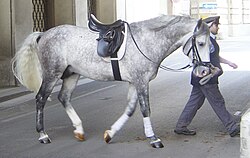| This is a documentation subpage for Template:Infobox horse color. It may contain usage information, categories and other content that is not part of the original template page. |
Blank
edit{{Infobox horse color
| name =
| image =
| image_alt =
| caption =
| synonyms =
| variants =
| base =
| modifiers =
| description =
| body =
| mane/tail =
| head/legs =
| skin =
| eyes =
| other =
}}
Usage
edit- name
- the title of the article or the non-disambiguated name of the color.
- image
- the image name without File: and without any code. The color/pattern should be illustrated as clearly as possible, without interfering dilutions/patterns playing around. A middle expression of a pattern is probably the best choice.
- image_alt
- a description of what is in the picture. Avoid jargon.
- synonyms
- include all mainstream synonyms used for the color. If UK English and USA English use commonly different terms, both can and probably should be included as equals, separated by a comma and with no brackets, designated US/UK as applicable.
- variants
- names of color variants discussed in article (i.e. red roan, blue roan, etc.) or obsolete/obscure names
- base
- should include the base color genotype of the color (only the locuses A or a and E or e). Use bolding to highlight and to indicate multiple requirements for the color. <sup></sup> to mark the alleles if needed. For example: EE or Ee and AA or Aa.
- modifiers
- include the modifying locuses and alleles for the color. Use bolding to highlight and to indicate multiple requirements for the color. <sup></sup> to mark the alleles if needed. For example: CCrCCr or CCrC and DD or Dd.
- description
- include the name of the base color (= black, chestnut, bay) and the modifying factors. For example: black + cream factor. Saying "factor" or "allele" instead of "gene" might be better.
The descriptions of the color should be worded so that any horse of the color/carrying the color allele fits in. In case of "picky" genes, dilutions for red and black pigment should be described separately, as in "black pigment diluted to dark grey or dark chocolate brown. Red pigment not affected". - body
- describe the color of the body, which includes torso and neck
- legs/face
- describe the color of the legs (and if applicable, of the hooves), and head/face of the horse, if different from body
- mane/tail
- for describing the mane and tail, if different from the body
- skin and eyes
- should be easy, noting if the gene influences these. For skin, "dark except under white markings present at birth" is a good general answer.
- other
- for any other stuff about the color/allele that is consistent. For example, a mention about the dark scars or "corn marks of roans could be included here.
Separate multiple values using {{flatlist}} or {{plainlist}}.
Examples
edit| Gray | |
|---|---|
 A gray Lipizzan horse | |
| Other names | Grey |
| Variants |
|
| Genotype | |
| Base color | Any |
| Modifying genes | Graying gene (G) dominant when single allele present |
| Phenotype | |
| Body | Born any color, progressively lightens with age until completely white, flea-bitten form may develop red hairs in a freckling pattern throughout coat, sometimes increasing with age |
| Head and Legs | May not gray at same rate as body, head may be first part of body to lighten, legs may be among last parts of body to lighten |
| Mane and tail | May not gray at same rate as body, lighter or darker |
| Skin | Usually black, except under white markings present at birth |
| Eyes | Usually dark brown, unless base color affected by other genes which lighten eye color |
| Other notes | Dominant over all other coat colors, when gray gene is present, horse will always become gray, may be masked if horse's base color is white |
{{Infobox horse color
| name=Gray
| image = Lipizzaner DSC02439.jpg
| caption = A gray [[Lipizzan]] horse
| image_alt = A gray horse with a saddle, being led
| synonyms = Grey
| variants = {{flatlist|
* dapple gray
* flea-bitten gray
* iron gray
* rose gray
}}
| base = Any
| modifiers = Graying gene (G) dominant when single allele present
| body = Born any color, progressively lightens with age until completely white, flea-bitten form may develop red hairs in a freckling pattern throughout coat, sometimes increasing with age
| head/legs = May not gray at same rate as body, head may be first part of body to lighten, legs may be among last parts of body to lighten
| mane/tail = May not gray at same rate as body, lighter or darker
| skin = Usually black, except under white markings present at birth
| eyes = Usually dark brown, unless base color affected by other genes which lighten eye color
| other = Dominant over all other coat colors, when gray gene is present, horse will always become gray, may be masked if horse's base color is white
}}
See also
edit- For articles about people
- For articles about horses
- {{Infobox named horse}}
- {{Infobox racehorse}}
- For articles about breeds and colors